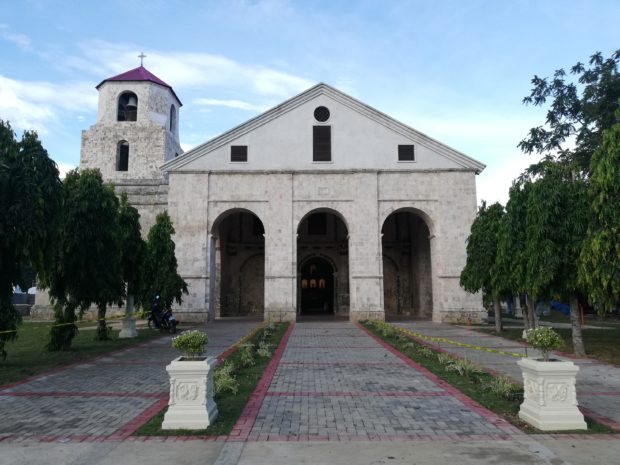Bohol church closed by quake damage for 6 years reopens at start of Misa de Gallo

CORTES, Bohol–For the first time in six years, the bells again rang at the newly restored Sto. Niño Parish Church here at dawn on Monday (Dec. 16), the start of the nine-day traditional dawn Masses leading up to Christmas Day.
Resident Angelo Tabaosares, 18, a resident of Barangay Upper Dela Paz, woke up ahead of the 4:30 a.m. Mass.
He said Christmas dawn Masses for Cortes town would be meaningful this year since it was the first time that the doors of the newly-restored church opened to the public after it was damaged by a 7.2-magnitude earthquake on Oct. 15, 2013.
“I am happy and blessed that the construction of our church is finally done,” said Tabaosares in the vernacular. He wants to be at every dawn Mass until Dec. 25.
Tabaosares was one of at least 1,300 parishioners who took part in Mass officiated by Rev. Fr. Roderick Pizarras, the head priest of Sto. Niño Parish for the past four years.
Pizarras said the church had not seen an overflow of devotees during the “Misa de Gallo” for a long time.
In his homily, he reminded the parishioners to emulate the humility of Jesus Christ. He also said that since the first Simbang Gabi was dedicated to the youth, parishioners should not lose hope because God has better plans for His people.
Parishioners became nostalgic of the newly-restored church especially since the details were close to the original.
“The details were exactly the same with what I saw when I was young,” said Marietta Mustasa, 75.
Pizarras said the restoration of the church was God’s blessing.
“The parishioners will do their best to preserve this church,” the priest said.
“I hope they come here, not just because of curiosity, but to praise and glorify the Lord,” he added.
Like other centuries-old churches in Bohol which were devastated by the earthquake, the Sto. Niño Church was made of coral stone.
At least 24 other ancient churches in Bohol were either destroyed or damaged. Ten were considered national heritage landmarks.
After the earthquake, church authorities decided to barricade the ruined church for public safety.
The church’s facade was damaged but the quake revealed the church’s original façade which could have been made by the Jesuits, and was hidden when the Augustinian Recollects came in early 1800.
Inside, the left wall of the altar sank a few inches deep. The side walls of the baptismal chamber was damaged.
Masses were held at the makeshift church made of nipa and bamboo at the town plaza for three years to keep the community’s faith alive.
A few years later, the Ong family who owns BQ Mall Corporation built the 400-square-meter alternative church with a seating capacity of 300 at a cost of at least P4 million. This serves as a venue for church gatherings and Masses while the original church underwent restoration.
In 2015, the national government through the National Museum declared the Santo Niño Church as among the country’s important cultural properties. Hence, it was eligible for restoration funds from the national government.
On Dec. 3, 2017, the time capsule containing the detailed plans of the church restoration was laid as Fr. Pizarras, church authorities, and the National Museum representatives looked on.
Pizarras said that the formal turnover of the restored church will be on January 16, 2020 during the town fiesta.
The Sto. Niño Parish Church is known for its bells and their “musicality.”
The church’s bell tower houses three bells dating back to the mid-1800s. The largest bell, weighing approximately over 50 kilograms, is the second oldest bell in Bohol.
With the newly-restored church, parishioners can strengthen their faith as the church bells ring for years to come.